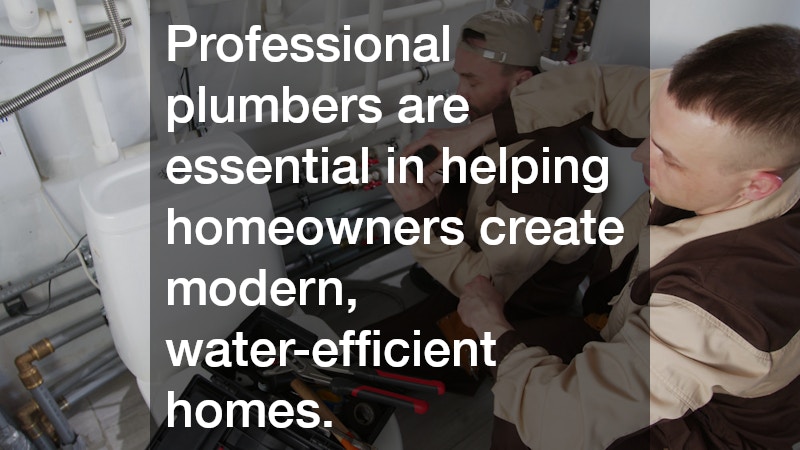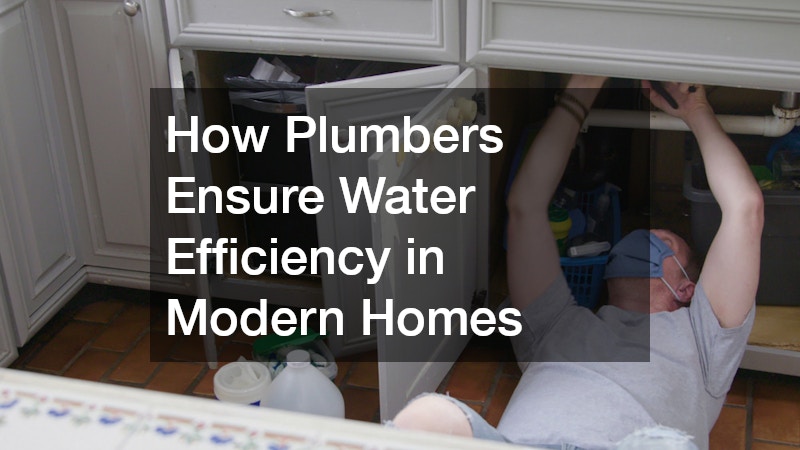Modern Australian homes are designed with sustainability in mind, and plumbers play a vital role in making them water-efficient. From installing the latest fixtures to detecting hidden leaks, plumbers are at the forefront of reducing water usage without compromising comfort or functionality.
As concerns about climate change and rising utility costs grow, more homeowners are turning to professional plumbing services to help manage their water consumption.
Water efficiency isn’t just about using less—it’s about smarter systems, better appliances and professional expertise. With the help of skilled plumbers, households can cut down on water waste, lower their bills and reduce their environmental impact.
Installing Water-Efficient Fixtures
One of the easiest ways to improve water efficiency in a home is by upgrading to modern, water-saving fixtures. Plumbers install low-flow showerheads, dual-flush toilets and mixer taps that maintain pressure while using less water. These installations make a significant difference to daily usage, especially in large households.
The Water Efficiency Labelling and Standards (WELS) scheme in Australia helps consumers choose fixtures based on star ratings. Plumbers understand which products meet WELS guidelines and how to install them correctly to maximise savings.
Professionally installed fixtures ensure that water is not wasted through poor fittings or low-quality materials. Even small upgrades across a home can lead to substantial reductions in water bills.
Detecting and Repairing Leaks
Leaking pipes and dripping taps are among the most common causes of water waste. Many leaks go unnoticed for months, particularly if they are hidden behind walls or under floors. Experienced plumbers use advanced tools like pressure testing and thermal imaging to locate leaks quickly and accurately.
Timely repairs not only prevent water waste but also protect homes from water damage. In regions prone to drought, fixing a single leaking tap can save thousands of litres each year.
Routine inspections by licensed plumbers help homeowners stay on top of potential problems and address issues before they become costly emergencies.
Smart Irrigation and Outdoor Solutions
Water use in Australian homes extends beyond the indoors. Garden irrigation systems, outdoor taps and pools can consume large volumes if not managed properly. Plumbers design and install efficient outdoor systems tailored to climate and landscaping needs.
Drip irrigation systems, rainwater tanks and automated timers are just some of the solutions plumbers use to minimise outdoor water use. By integrating sensors and smart technology, these systems deliver water where and when it’s needed most, reducing waste.
Plumbers can also connect rainwater tanks to household plumbing for toilet flushing and laundry use, further enhancing water efficiency.
Hot Water System Optimisation
Hot water accounts for a large share of household water usage. Plumbers ensure systems are correctly sized, properly insulated and operating at the right temperature. An outdated or poorly maintained hot water system can result in long wait times for hot water and unnecessary water loss.
Modern energy-efficient systems like solar hot water and heat pumps are popular upgrades. Plumbers guide homeowners in choosing the right solution based on household size, usage patterns and budget. Proper installation is key to ensuring long-term efficiency and performance.
Retrofitting and Renovation Support
When renovating bathrooms, kitchens or laundries, plumbers play a crucial role in designing efficient plumbing layouts and recommending water-saving fixtures. They identify opportunities to install greywater systems or reuse rainwater for non-potable purposes.
Working with plumbers from the start of a renovation ensures water systems are compliant with current regulations and optimised for efficiency. It also avoids costly rework later on.
Retrofitting older homes with updated plumbing can significantly improve water performance without requiring major changes to layout or style.
Educating Homeowners
Beyond technical expertise, plumbers educate homeowners on simple habits that support water efficiency. They provide tips on how to detect leaks early, adjust water pressure and clean filters.
They may also offer advice on how often to service appliances, how to reduce hot water use and how to interpret water bills to identify usage spikes.
This guidance empowers households to take responsibility for their water use and make informed decisions about upgrades or repairs.
Supporting Broader Sustainability Goals
By improving water efficiency, plumbers contribute to wider environmental goals such as drought resilience, water conservation and reduced energy demand. Less water use means less energy required for heating and pumping, which also lowers carbon emissions.
Plumbers are part of the broader push toward sustainable living and resilient home design. Their work helps households meet state and federal targets for water and energy efficiency, especially in areas with strict building codes and conservation requirements.
Professional plumbers are essential in helping homeowners create modern, water-efficient homes. Their skills and knowledge go far beyond fixing leaks—they advise on smart system design, upgrade outdated fixtures and promote responsible water use indoors and out.
With their help, Australians can lower their water bills, reduce their environmental impact and enjoy the comfort of a home that meets the needs of the future. Whether you’re building new, renovating or simply upgrading old fixtures, a qualified plumber ensures your home stays efficient and sustainable for years to come.

